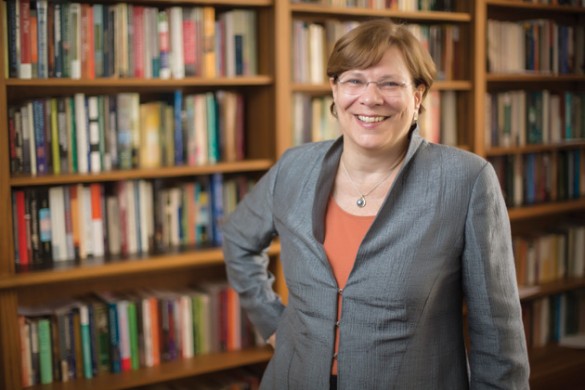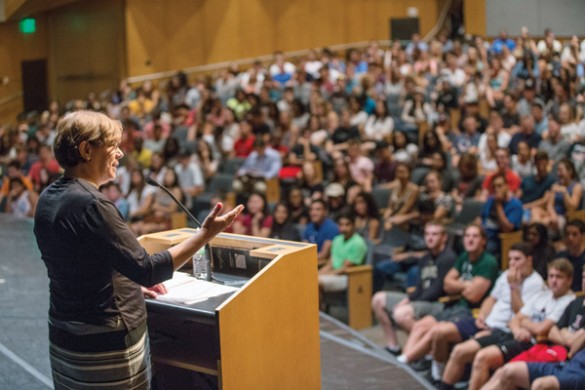
Lauren Benton grew up surrounded by scholars and teachers. Her father was a faculty member and dean at Johns Hopkins University.
Despite that, she didn’t plan on becoming an academic.
“I was around the university my whole childhood, but it wasn’t what I initially thought of doing,” said Benton, who earned an undergraduate degree in economics from Harvard, then headed off to Europe. “I tried lots of other things before coming back to academia.”
Those things included working for a press bureau in Madrid, where she met her future husband; serving as a cook on an Englishman’s yacht—“I was a terrible cook,” she said; and teaching in job programs in New York City.
“I was teaching Dominican and Russian immigrants job skills, bookkeeping, English as a second language and GED, and I realized I liked being in the classroom,” she said. “I was in the classroom for seven hours a day. I figured if I enjoyed doing it that many hours—and teaching bookkeeping—then I’d enjoy teaching a subject that I loved to university students.”
Benton, who became dean of Vanderbilt’s College of Arts and Science and the Nelson O. Tyrone, Jr. Professor of History July 1, certainly plans to spend time in the classroom at Vanderbilt.
“[lquote]I love to teach. I think teaching is at the heart of what the university does,” she said.[/lquote] “I always feel much more connected to students as an administrator when I teach. I’ll be teaching a Vanderbilt class in fall 2016—maybe a freshman seminar on piracy, one of the subjects I’ve written about.”
In the meantime, she’ll be digging in to the challenges presented by her new role as academic and administrative head of the university’s largest school. They are good challenges, according to Benton.
“It’s absolutely essential that you keep making great hires on the faculty level. You want people who are going to move fields forward, contribute to the intellectual environment and be great teachers,” she said.
Among the many priorities Benton sees is one to enhance diversity among the faculty, undergraduates and doctoral students. She’s also dedicated to the ideas behind Vanderbilt’s Academic Strategic Plan. “Vanderbilt’s single campus makes it possible to work toward common goals across the university in uniquely exciting ways,” she observed.

Although undergraduate education in Arts and Science is thriving, with its strong disciplinary and interdisciplinary majors, Benton wants to work with faculty in considering whether some curricular innovations might be tried, possibly in international and global studies. “Vanderbilt has enormous strength in key international areas like Latin American studies, German studies and development economics. It would make sense to make those strengths more visible both within and outside the university,” she said.
“At the doctoral level, it’s a good time to take a close look at Arts and Science to make sure that we’re competitive, bringing in the very best doctoral students and offering them the right mix of support,” said Benton, noting that one challenge is preparing doctoral students for professions as well as academic employment.
“The creation of knowledge is very fluid,” she said, noting that it is always a challenge to stay ahead of new trends such as the move toward so-called big data. “Fortunately there is already a solid culture of working across disciplines at Vanderbilt, with first-rate programs in neuroscience, biochemistry and the study of medicine and health.”
Benton came to Vanderbilt from New York University, where she served as dean of the Graduate School of Arts and Science and Silver Professor in History. She joined NYU as professor of history in 2003 and added academic leadership roles—in 2009 as acting dean of the humanities, then as dean of the humanities in 2010. She was appointed dean of the Graduate School of Arts and Science in 2012.
Prior to joining NYU, she held appointments at Rutgers University–New Jersey Institute of Technology, the University of Washington, and Massachusetts Institute of Technology.
Benton said she sees some similarities between NYU and Vanderbilt, particularly in that both are vibrant university environments on upward trajectories. “[rquote]Vanderbilt is a great university that is on its way to becoming greater. Those are the best kinds of places to work because you’ve already got fantastic faculty, staff and students to work with, but you can get better and do some exciting things,” she said.[/rquote]
The opportunity to be part of catapulting Vanderbilt into the very top echelons of higher education drew Benton to Nashville. “Arts and Science has some superb departments and programs,” she observed. “And Nashville is now widely known as a great place to live. Together that makes for a great environment for recruiting the best faculty and students.”
Another Nashville plus is that she and her husband, Eduardo Garcia, can live close to campus. Garcia, who is originally from Uruguay, is a Spanish-language interpreter who has an interpreting agency and primarily works in courts. They have two daughters, Victoria, who lives in Colorado, and Gabriela, who recently graduated from NYU.
Academically, Benton’s first love is history. “I describe myself as a world historian, with a focus on law in the early modern world,” she said. When she decided to go to graduate school, Benton chose to pursue a joint Ph.D. in history and anthropology at Johns Hopkins.
Although initially she worked in economic anthropology and conducted fieldwork in Spain and Latin America, Benton found herself drawn to legal history, and she helped create a new field focusing on the comparative history of law in colonial settings. “Law used to be studied in such nationalist frameworks that there wasn’t a good framework for bringing it into a larger conversation about the history of the world order, international law and cultural interactions,” she said. “I realized I had a burning desire to change that.”
Today a distinguished and highly influential scholar in international legal history, Benton says that when she wrote her first book, there were few other people doing the same sort of research. “Now there’s been an explosion of works in comparative legal history, on the history of law and cross-cultural interactions, and on the history of international law,” she said. “It’s been enormously gratifying to be part of the founding of a new field.
“[lquote]That is really what gives one the most satisfaction as a researcher—knowing that you opened up new areas of inquiry for other people to pursue.[/lquote] It’s been rewarding and never dull,” she said.
In her first 100 days, the new dean has concentrated on getting to know Arts and Science and Vanderbilt better. “It’s most important for me to understand what people already think about existing strengths and how they can be developed further. I want to know what faculty and students are thinking about Vanderbilt’s future,” she said.
Benton is an administrator known for her fairness. Her leadership style is to work collaboratively rather than top-down.
“[rquote]The main thing in academic administration is not to impose one’s vision on other people, but to work together to realize the best possible vision,” she said.[/rquote] “I like talking to people, collecting their ideas and working collaboratively. I like to create faculty working groups, and I like to get student input in a variety of different ways. I tend to have a collegial, very good relationship with people.
“The reason anybody goes into academic administration and stays in it is that you get to facilitate other people’s contributions,” Benton said. “That’s really what my job is. It’s making sure that people who are already here in the College of Arts and Science and those who will be coming here get to do the best work that they can. As an administrator, you have to enjoy facilitating other people’s success, and I do. I find that enormously satisfying.”